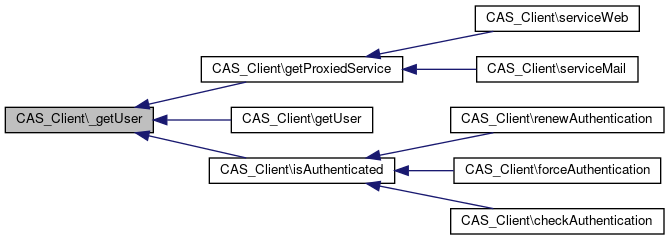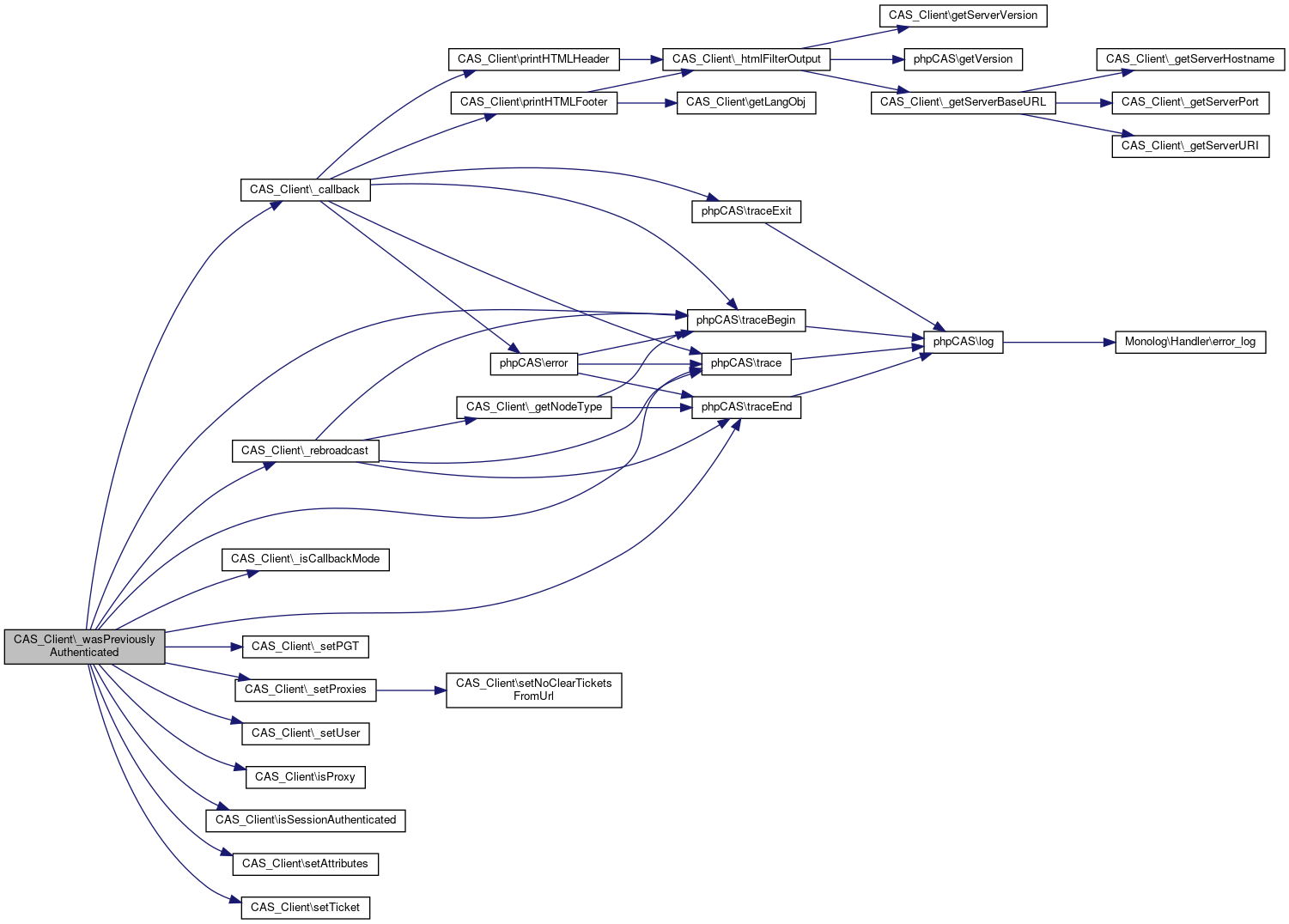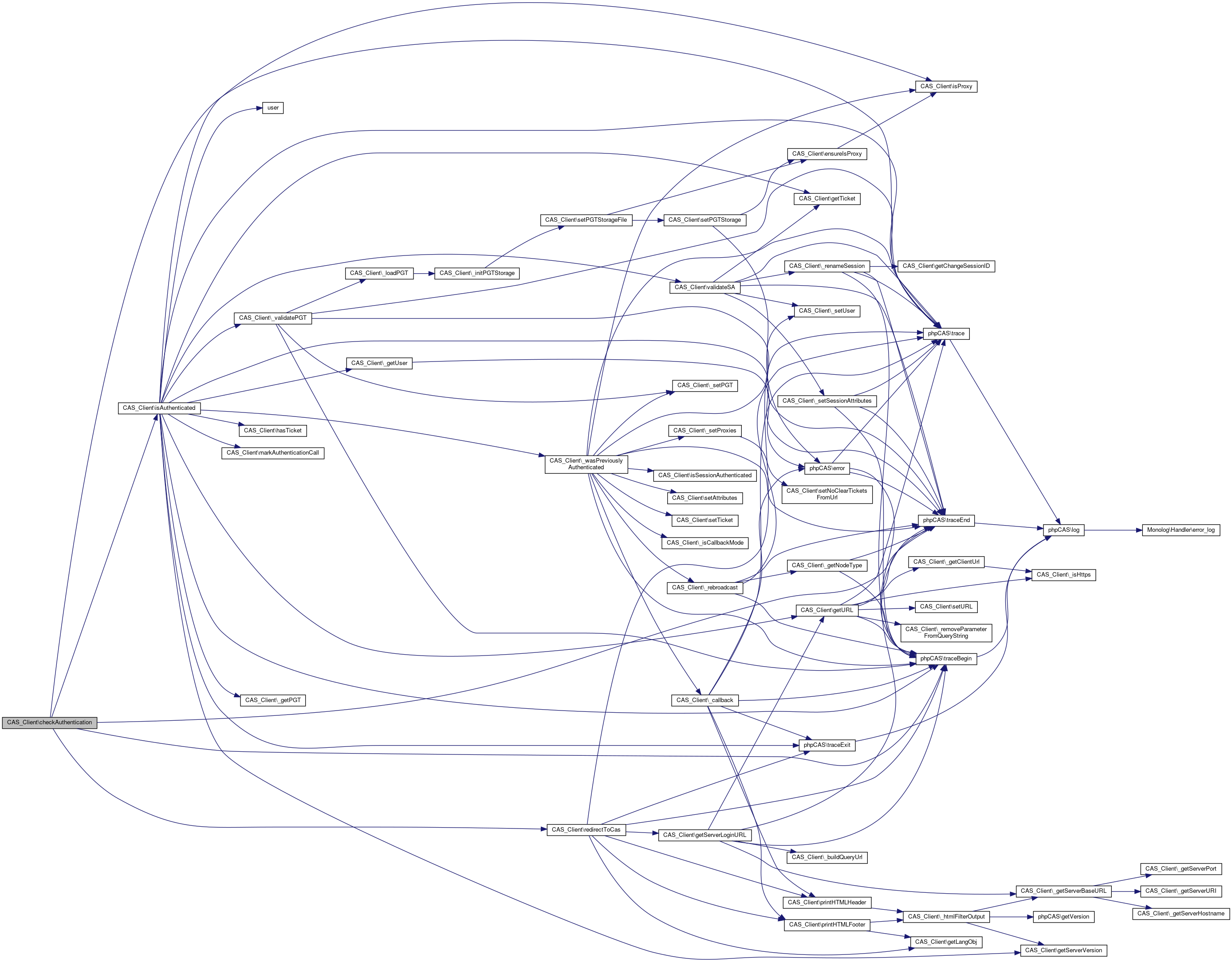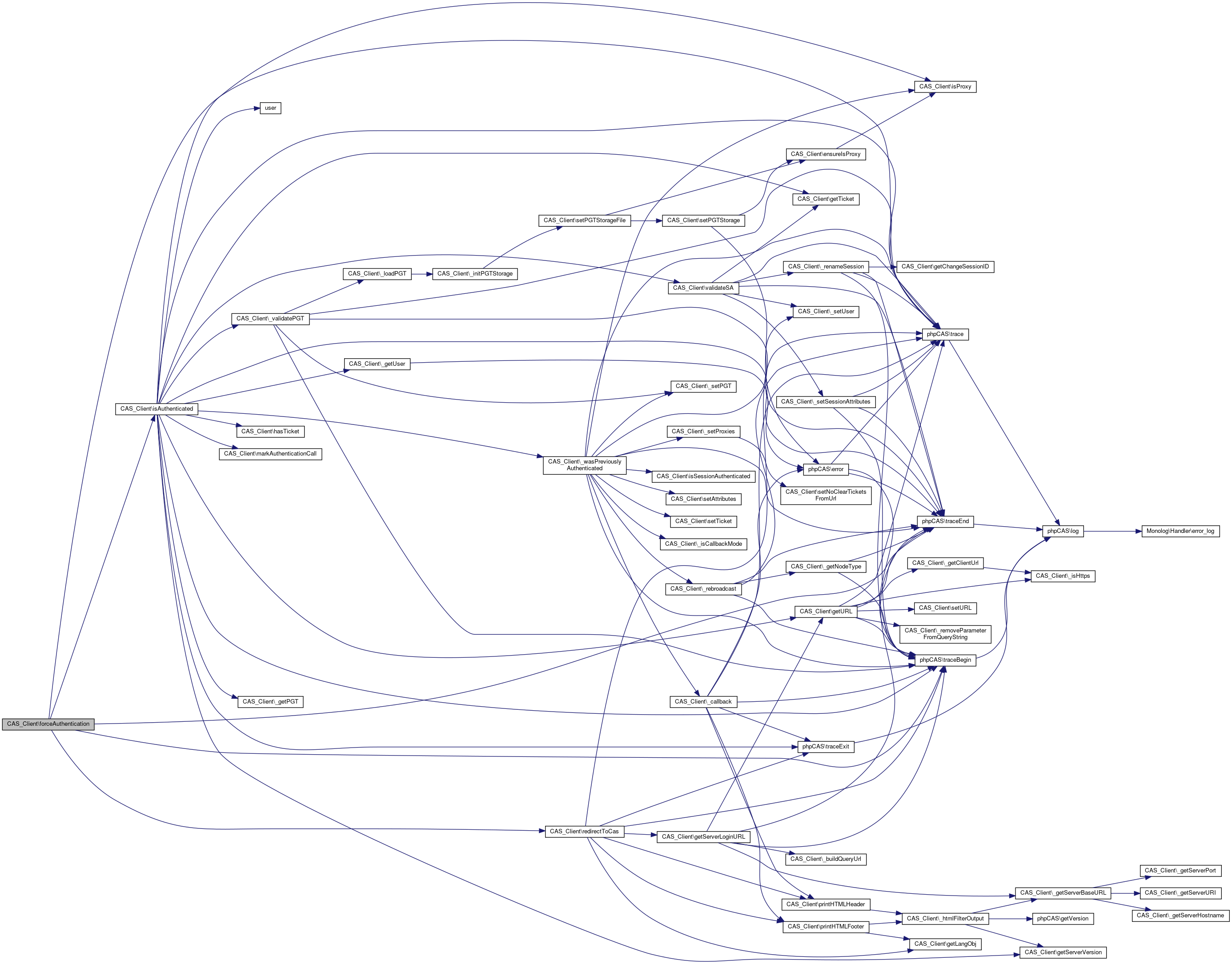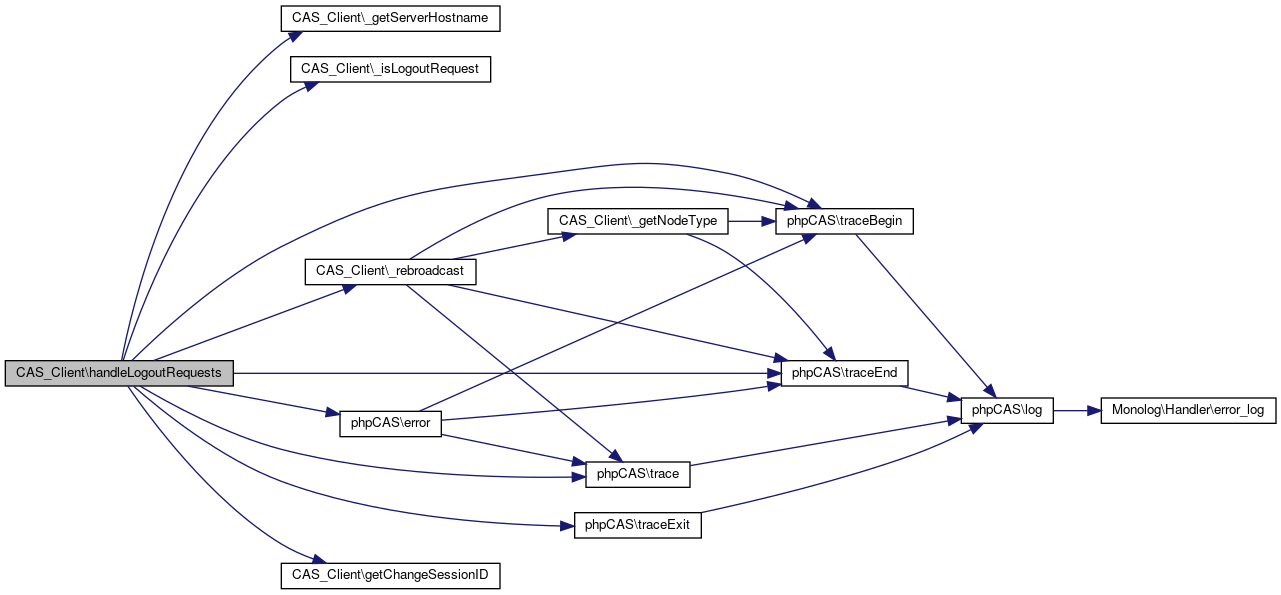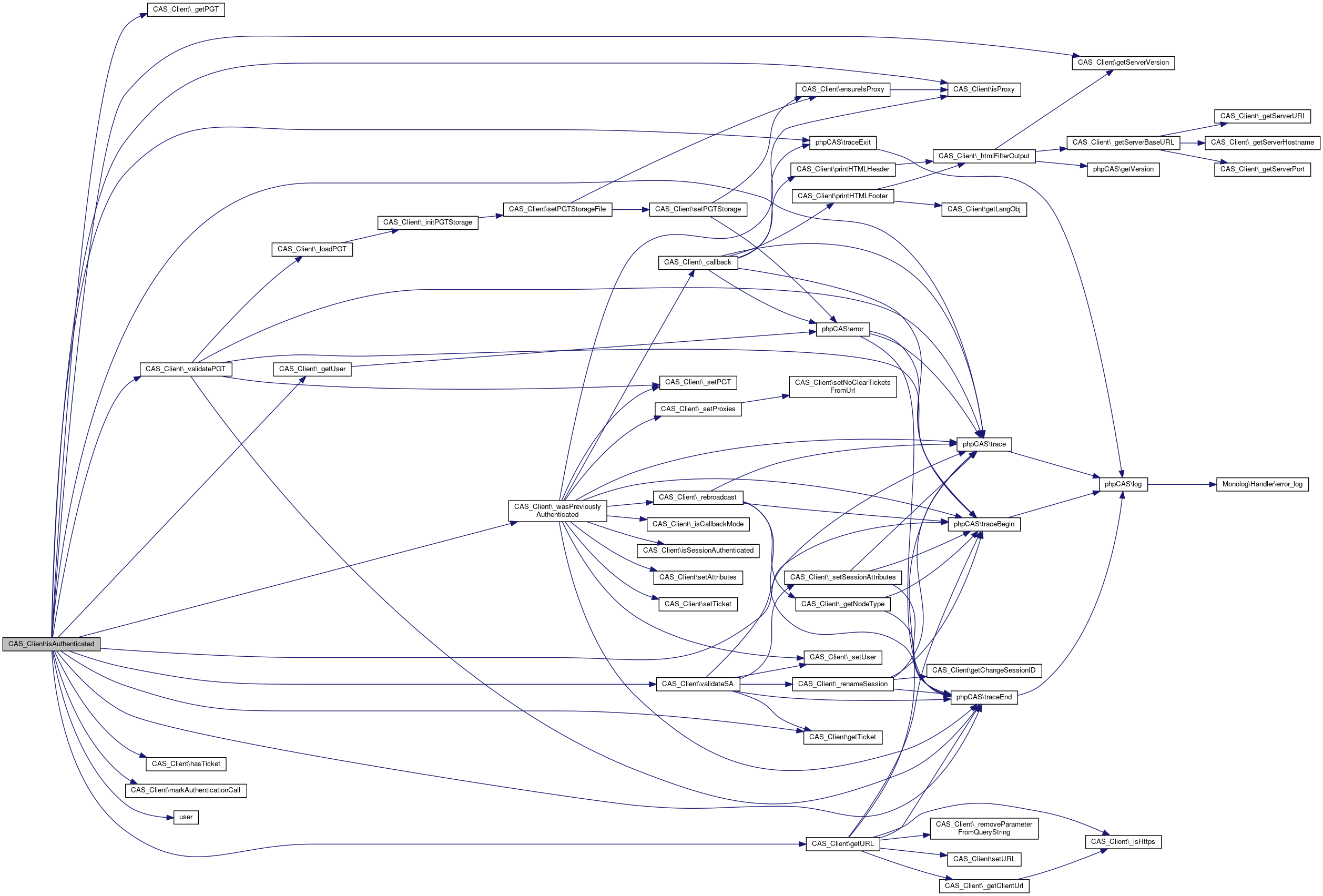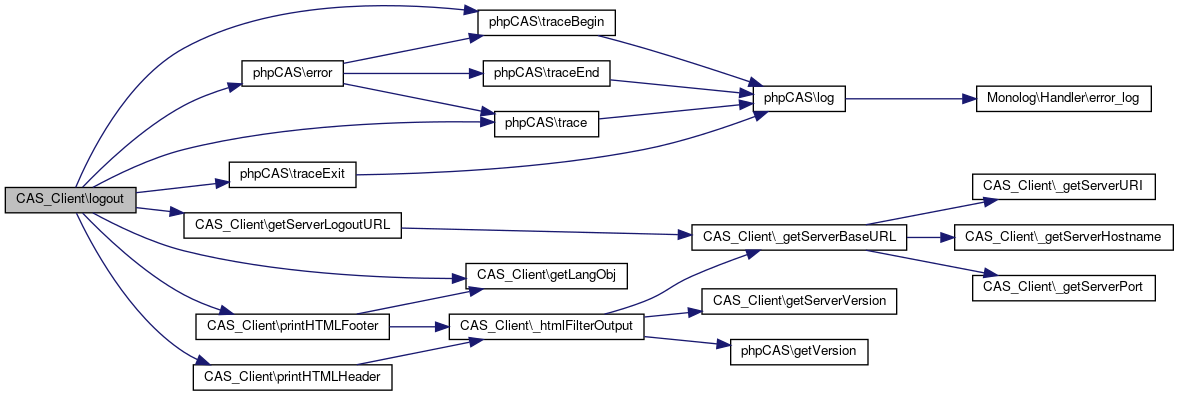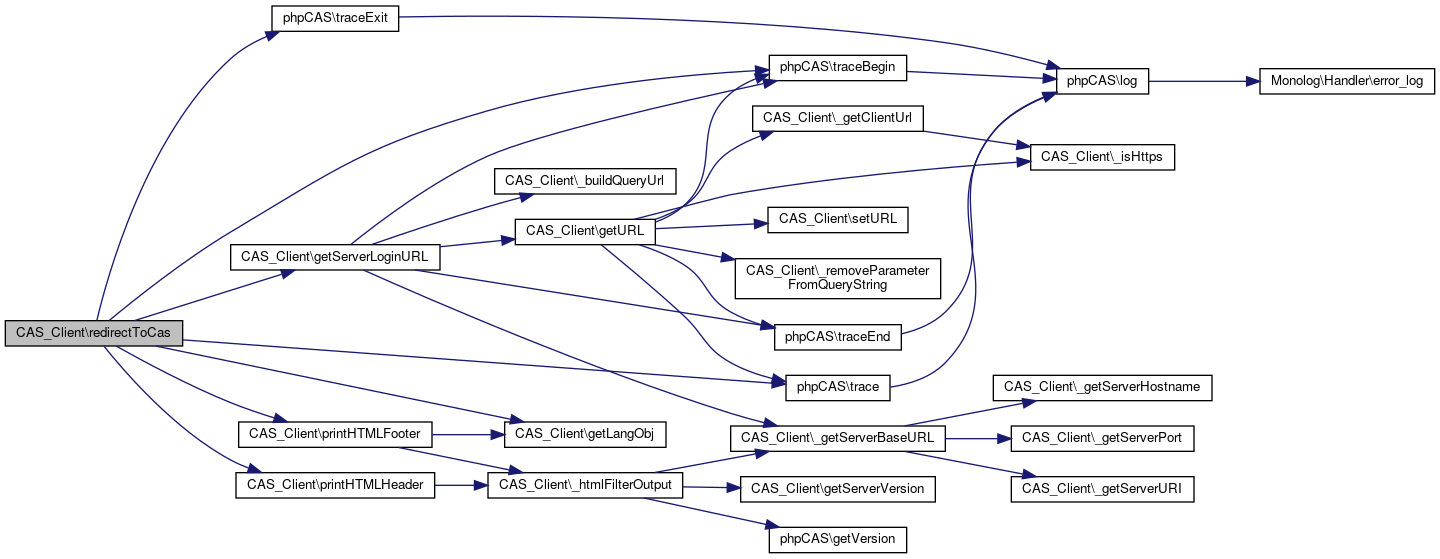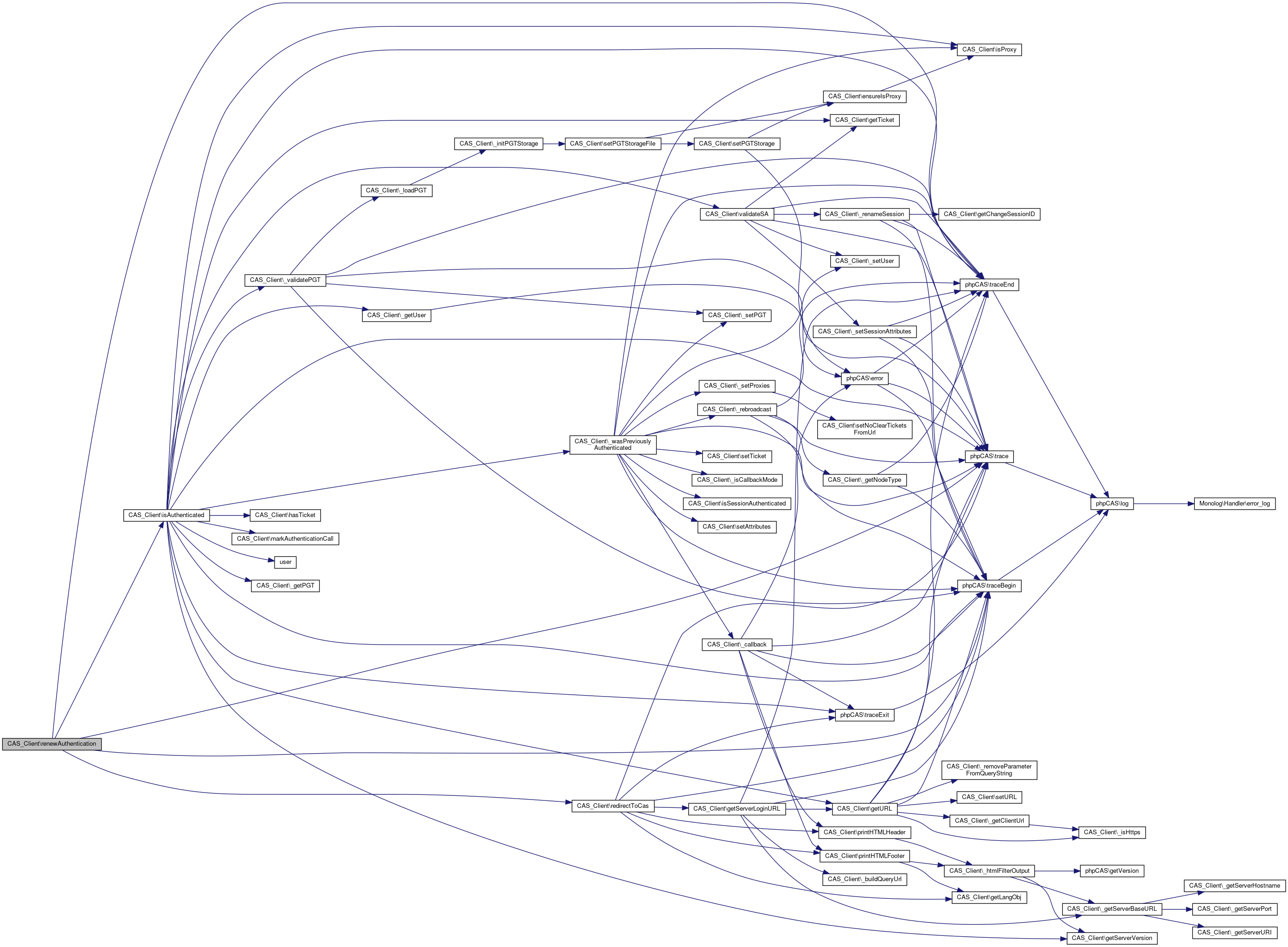 Collaboration diagram for Authentication:
Collaboration diagram for Authentication:Functions | |
| CAS_Client::_setUser ($user) | |
| This method sets the CAS user's login name. More... | |
| CAS_Client::getUser () | |
| This method returns the CAS user's login name. More... | |
| CAS_Client::_getUser () | |
| This method returns the CAS user's login name. More... | |
| CAS_Client::setAttributes ($attributes) | |
| Set an array of attributes. More... | |
| CAS_Client::getAttributes () | |
| Get an key values arry of attributes. More... | |
| CAS_Client::hasAttributes () | |
| Check whether attributes are available. More... | |
| CAS_Client::hasAttribute ($key) | |
| Check whether a specific attribute with a name is available. More... | |
| CAS_Client::_hasAttribute ($key) | |
| Check whether a specific attribute with a name is available. More... | |
| CAS_Client::getAttribute ($key) | |
| Get a specific attribute by name. More... | |
| CAS_Client::renewAuthentication () | |
| This method is called to renew the authentication of the user If the user is authenticated, renew the connection If not, redirect to CAS. More... | |
| CAS_Client::forceAuthentication () | |
| This method is called to be sure that the user is authenticated. More... | |
| CAS_Client::setCacheTimesForAuthRecheck ($n) | |
| Set the number of times authentication will be cached before rechecked. More... | |
| CAS_Client::checkAuthentication () | |
| This method is called to check whether the user is authenticated or not. More... | |
| CAS_Client::isAuthenticated ($renew=false) | |
| This method is called to check if the user is authenticated (previously or by tickets given in the URL). More... | |
| CAS_Client::isSessionAuthenticated () | |
| This method tells if the current session is authenticated. More... | |
| CAS_Client::_wasPreviouslyAuthenticated () | |
| This method tells if the user has already been (previously) authenticated by looking into the session variables. More... | |
| CAS_Client::redirectToCas ($gateway=false, $renew=false) | |
| This method is used to redirect the client to the CAS server. More... | |
| CAS_Client::logout ($params) | |
| This method is used to logout from CAS. More... | |
| CAS_Client::_isLogoutRequest () | |
| Check of the current request is a logout request. More... | |
| CAS_Client::handleLogoutRequests ($check_client=true, $allowed_clients=false) | |
| This method handles logout requests. More... | |
Variables | |
| CAS_Client::$_user | |
| The Authenticated user. More... | |
| CAS_Client::$_attributes | |
| The Authenticated users attributes. More... | |
| CAS_Client::$_cache_times_for_auth_recheck | |
| An integer that gives the number of times authentication will be cached before rechecked. More... | |
Detailed Description
Function Documentation
◆ _getUser()
|
private |
This method returns the CAS user's login name.
- Returns
- string the login name of the authenticated user
- Warning
- should be called only after CAS_Client::forceAuthentication() or CAS_Client::isAuthenticated(), otherwise halt with an error.
Definition at line 1134 of file Client.php.
References CAS_Client\$_user, and phpCAS\error().
Referenced by CAS_Client\getProxiedService(), CAS_Client\getUser(), and CAS_Client\isAuthenticated().
 Here is the call graph for this function:
Here is the call graph for this function: Here is the caller graph for this function:
Here is the caller graph for this function:◆ _hasAttribute()
|
private |
Check whether a specific attribute with a name is available.
- Parameters
-
string $key name of attribute
- Returns
- bool is attribute available
Definition at line 1221 of file Client.php.
Referenced by CAS_Client\getAttribute(), and CAS_Client\hasAttribute().
 Here is the caller graph for this function:
Here is the caller graph for this function:◆ _isLogoutRequest()
|
private |
Check of the current request is a logout request.
- Returns
- bool is logout request.
Definition at line 1720 of file Client.php.
References $_POST.
Referenced by CAS_Client\__construct(), and CAS_Client\handleLogoutRequests().
 Here is the caller graph for this function:
Here is the caller graph for this function:◆ _setUser()
|
private |
This method sets the CAS user's login name.
- Parameters
-
string $user the login name of the authenticated user.
- Returns
- void
Definition at line 1105 of file Client.php.
Referenced by CAS_Client\_wasPreviouslyAuthenticated().
 Here is the caller graph for this function:
Here is the caller graph for this function:◆ _wasPreviouslyAuthenticated()
|
private |
This method tells if the user has already been (previously) authenticated by looking into the session variables.
- Note
- This function switches to callback mode when needed.
- Returns
- true when the user has already been authenticated; false otherwise.
Definition at line 1549 of file Client.php.
References $_POST, $_SESSION, CAS_Client\_callback(), CAS_Client\_isCallbackMode(), CAS_Client\_rebroadcast(), CAS_Client\_setPGT(), CAS_Client\_setProxies(), CAS_Client\_setUser(), CAS_Client\isProxy(), CAS_Client\isSessionAuthenticated(), CAS_Client\setAttributes(), CAS_Client\setTicket(), phpCAS\trace(), phpCAS\traceBegin(), and phpCAS\traceEnd().
Referenced by CAS_Client\isAuthenticated().
 Here is the call graph for this function:
Here is the call graph for this function: Here is the caller graph for this function:
Here is the caller graph for this function:◆ checkAuthentication()
| CAS_Client::checkAuthentication | ( | ) |
This method is called to check whether the user is authenticated or not.
- Returns
- true when the user is authenticated, false when a previous gateway login failed or the function will not return if the user is redirected to the cas server for a gateway login attempt
Definition at line 1327 of file Client.php.
References $_SESSION, $res, CAS_Client\isAuthenticated(), CAS_Client\redirectToCas(), phpCAS\trace(), phpCAS\traceBegin(), and phpCAS\traceEnd().
 Here is the call graph for this function:
Here is the call graph for this function:◆ forceAuthentication()
| CAS_Client::forceAuthentication | ( | ) |
This method is called to be sure that the user is authenticated.
When not authenticated, halt by redirecting to the CAS server; otherwise return true.
- Returns
- true when the user is authenticated; otherwise halt.
Definition at line 1276 of file Client.php.
References $_SESSION, $res, CAS_Client\isAuthenticated(), CAS_Client\redirectToCas(), phpCAS\trace(), phpCAS\traceBegin(), and phpCAS\traceEnd().
 Here is the call graph for this function:
Here is the call graph for this function:◆ getAttribute()
| CAS_Client::getAttribute | ( | $key | ) |
Get a specific attribute by name.
- Parameters
-
string $key name of attribute
- Returns
- string attribute values
Definition at line 1234 of file Client.php.
References CAS_Client\_hasAttribute(), and CAS_Client\ensureAuthenticationCallSuccessful().
 Here is the call graph for this function:
Here is the call graph for this function:◆ getAttributes()
| CAS_Client::getAttributes | ( | ) |
Get an key values arry of attributes.
- Returns
- arry of attributes
Definition at line 1172 of file Client.php.
References CAS_Client\$_attributes, CAS_Client\ensureAuthenticationCallSuccessful(), and phpCAS\error().
 Here is the call graph for this function:
Here is the call graph for this function:◆ getUser()
| CAS_Client::getUser | ( | ) |
This method returns the CAS user's login name.
- Returns
- string the login name of the authenticated user
- Warning
- should be called only after CAS_Client::forceAuthentication() or CAS_Client::isAuthenticated(), otherwise halt with an error.
Definition at line 1118 of file Client.php.
References CAS_Client\_getUser(), and CAS_Client\ensureAuthenticationCallSuccessful().
 Here is the call graph for this function:
Here is the call graph for this function:◆ handleLogoutRequests()
| CAS_Client::handleLogoutRequests | ( | $check_client = true, |
|
$allowed_clients = false |
|||
| ) |
This method handles logout requests.
- Parameters
-
bool $check_client true to check the client bofore handling the request, false not to perform any access control. True by default. bool $allowed_clients an array of host names allowed to send logout requests.
- Returns
- void
Definition at line 1735 of file Client.php.
References $_COOKIE, $_GET, $_POST, $_SERVER, CAS_Client\$_signoutCallbackArgs, $client, CAS_Client\_getServerHostname(), CAS_Client\_isLogoutRequest(), CAS_Client\_rebroadcast(), phpCAS\error(), CAS_Client\getChangeSessionID(), phpCAS\trace(), phpCAS\traceBegin(), phpCAS\traceEnd(), and phpCAS\traceExit().
 Here is the call graph for this function:
Here is the call graph for this function:◆ hasAttribute()
| CAS_Client::hasAttribute | ( | $key | ) |
Check whether a specific attribute with a name is available.
- Parameters
-
string $key name of attribute
- Returns
- bool is attribute available
Definition at line 1206 of file Client.php.
References CAS_Client\_hasAttribute(), and CAS_Client\ensureAuthenticationCallSuccessful().
 Here is the call graph for this function:
Here is the call graph for this function:◆ hasAttributes()
| CAS_Client::hasAttributes | ( | ) |
Check whether attributes are available.
- Returns
- bool attributes available
Definition at line 1192 of file Client.php.
References CAS_Client\ensureAuthenticationCallSuccessful().
 Here is the call graph for this function:
Here is the call graph for this function:◆ isAuthenticated()
| CAS_Client::isAuthenticated | ( | $renew = false | ) |
This method is called to check if the user is authenticated (previously or by tickets given in the URL).
- Parameters
-
bool $renew true to force the authentication with the CAS server
- Returns
- true when the user is authenticated. Also may redirect to the same URL without the ticket.
Definition at line 1388 of file Client.php.
References $_SESSION, $res, CAS_Client\_getPGT(), CAS_Client\_getUser(), CAS_Client\_validatePGT(), CAS_Client\_wasPreviouslyAuthenticated(), CAS_VERSION_1_0, CAS_VERSION_2_0, CAS_VERSION_3_0, error(), CAS_Client\getServerVersion(), CAS_Client\getTicket(), CAS_Client\getURL(), CAS_Client\hasTicket(), CAS_Client\isProxy(), CAS_Client\markAuthenticationCall(), phpCAS\trace(), phpCAS\traceBegin(), phpCAS\traceEnd(), phpCAS\traceExit(), user(), and CAS_Client\validateSA().
Referenced by CAS_Client\checkAuthentication(), CAS_Client\forceAuthentication(), and CAS_Client\renewAuthentication().
 Here is the call graph for this function:
Here is the call graph for this function: Here is the caller graph for this function:
Here is the caller graph for this function:◆ isSessionAuthenticated()
| CAS_Client::isSessionAuthenticated | ( | ) |
This method tells if the current session is authenticated.
- Returns
- true if authenticated based soley on $_SESSION variable
Definition at line 1536 of file Client.php.
References $_SESSION.
Referenced by CAS_Client\__construct(), and CAS_Client\_wasPreviouslyAuthenticated().
 Here is the caller graph for this function:
Here is the caller graph for this function:◆ logout()
| CAS_Client::logout | ( | $params | ) |
This method is used to logout from CAS.
- Parameters
-
array $params an array that contains the optional url and service parameters that will be passed to the CAS server
- Returns
- void
Definition at line 1681 of file Client.php.
References $lang, $params, phpCAS\error(), CAS_Client\getLangObj(), CAS_Client\getServerLogoutURL(), CAS_Client\printHTMLFooter(), CAS_Client\printHTMLHeader(), phpCAS\trace(), phpCAS\traceBegin(), and phpCAS\traceExit().
 Here is the call graph for this function:
Here is the call graph for this function:◆ redirectToCas()
| CAS_Client::redirectToCas | ( | $gateway = false, |
|
$renew = false |
|||
| ) |
This method is used to redirect the client to the CAS server.
It is used by CAS_Client::forceAuthentication() and CAS_Client::checkAuthentication().
- Parameters
-
bool $gateway true to check authentication, false to force it bool $renew true to force the authentication with the CAS server
- Returns
- void
Definition at line 1653 of file Client.php.
References $lang, CAS_Client\getLangObj(), CAS_Client\getServerLoginURL(), CAS_Client\printHTMLFooter(), CAS_Client\printHTMLHeader(), phpCAS\trace(), phpCAS\traceBegin(), and phpCAS\traceExit().
Referenced by CAS_Client\checkAuthentication(), CAS_Client\forceAuthentication(), and CAS_Client\renewAuthentication().
 Here is the call graph for this function:
Here is the call graph for this function: Here is the caller graph for this function:
Here is the caller graph for this function:◆ renewAuthentication()
| CAS_Client::renewAuthentication | ( | ) |
This method is called to renew the authentication of the user If the user is authenticated, renew the connection If not, redirect to CAS.
- Returns
- true when the user is authenticated; otherwise halt.
Definition at line 1251 of file Client.php.
References $_SESSION, $res, CAS_Client\isAuthenticated(), CAS_Client\redirectToCas(), phpCAS\trace(), phpCAS\traceBegin(), and phpCAS\traceEnd().
 Here is the call graph for this function:
Here is the call graph for this function:◆ setAttributes()
| CAS_Client::setAttributes | ( | $attributes | ) |
Set an array of attributes.
- Parameters
-
array $attributes a key value array of attributes
- Returns
- void
Definition at line 1162 of file Client.php.
Referenced by CAS_Client\_wasPreviouslyAuthenticated().
 Here is the caller graph for this function:
Here is the caller graph for this function:◆ setCacheTimesForAuthRecheck()
| CAS_Client::setCacheTimesForAuthRecheck | ( | $n | ) |
Set the number of times authentication will be cached before rechecked.
- Parameters
-
int $n number of times to wait for a recheck
- Returns
- void
Definition at line 1312 of file Client.php.
References $n.
Variable Documentation
◆ $_attributes
|
private |
The Authenticated users attributes.
Written by CAS_Client::setAttributes(), read by CAS_Client::getAttributes().
- Attention
- client applications should use phpCAS::getAttributes().
Definition at line 1153 of file Client.php.
Referenced by CAS_Client\getAttributes().
◆ $_cache_times_for_auth_recheck
|
private |
An integer that gives the number of times authentication will be cached before rechecked.
Definition at line 1303 of file Client.php.
◆ $_user
|
private |
The Authenticated user.
Written by CAS_Client::_setUser(), read by CAS_Client::getUser().
Definition at line 1096 of file Client.php.
Referenced by CAS_Client\_getUser().


